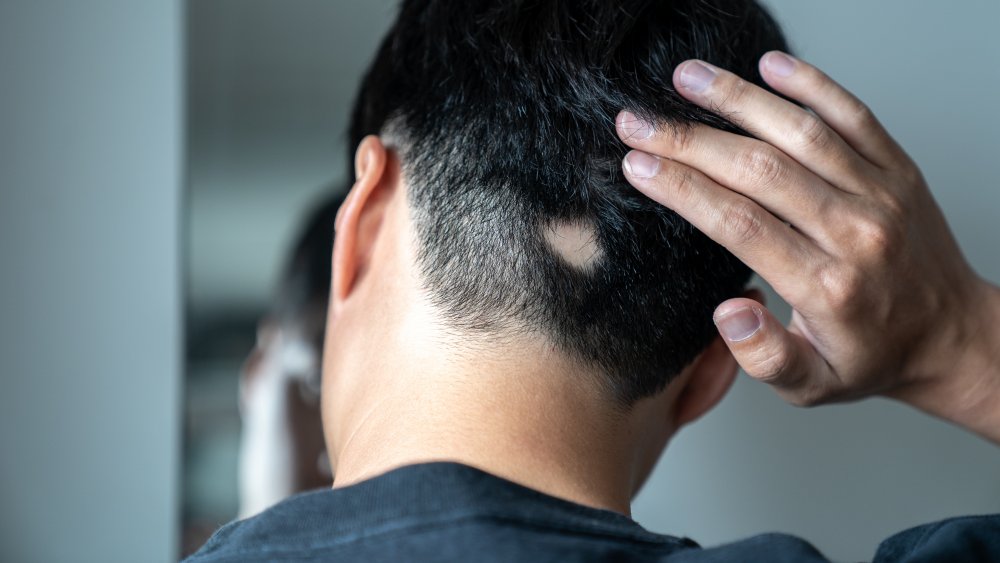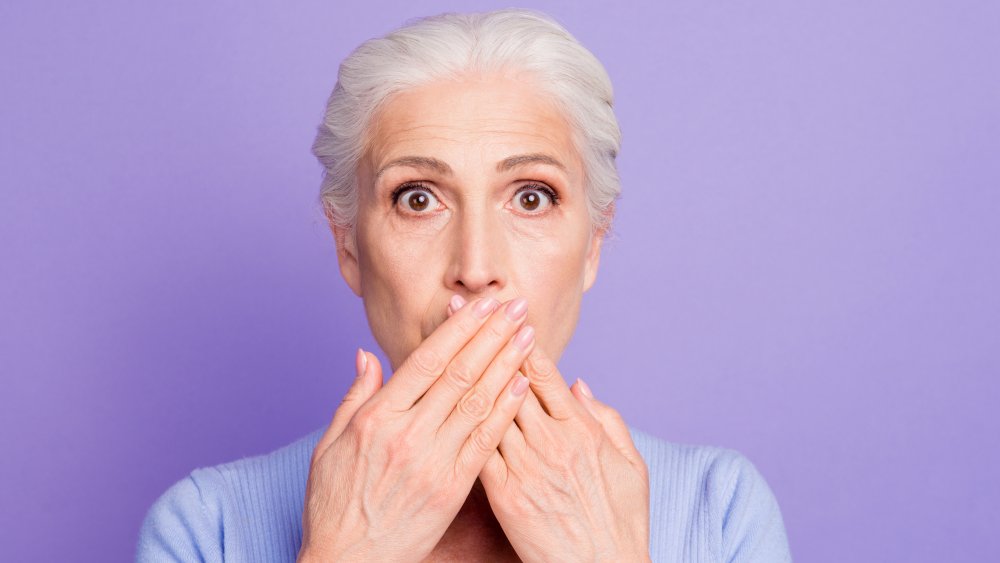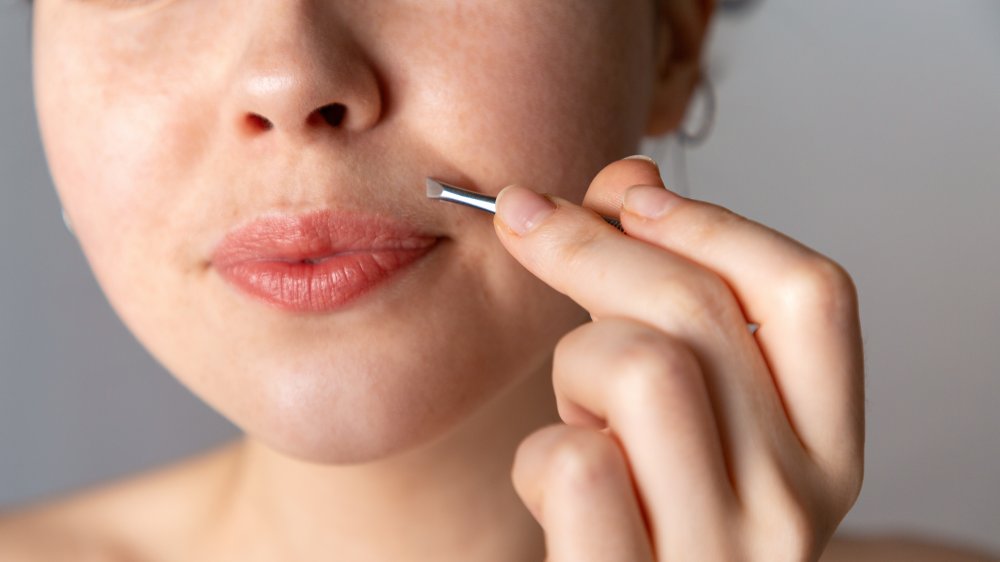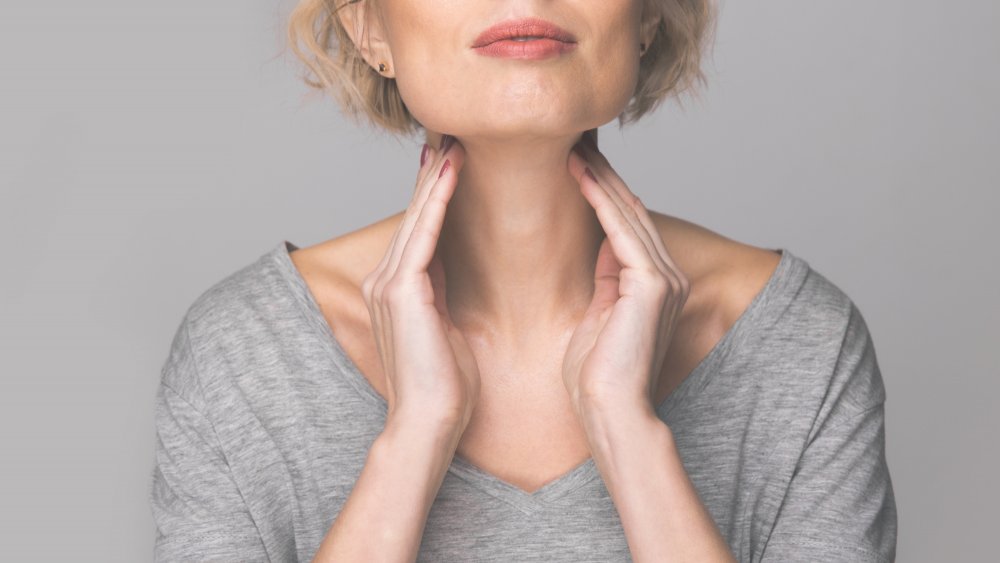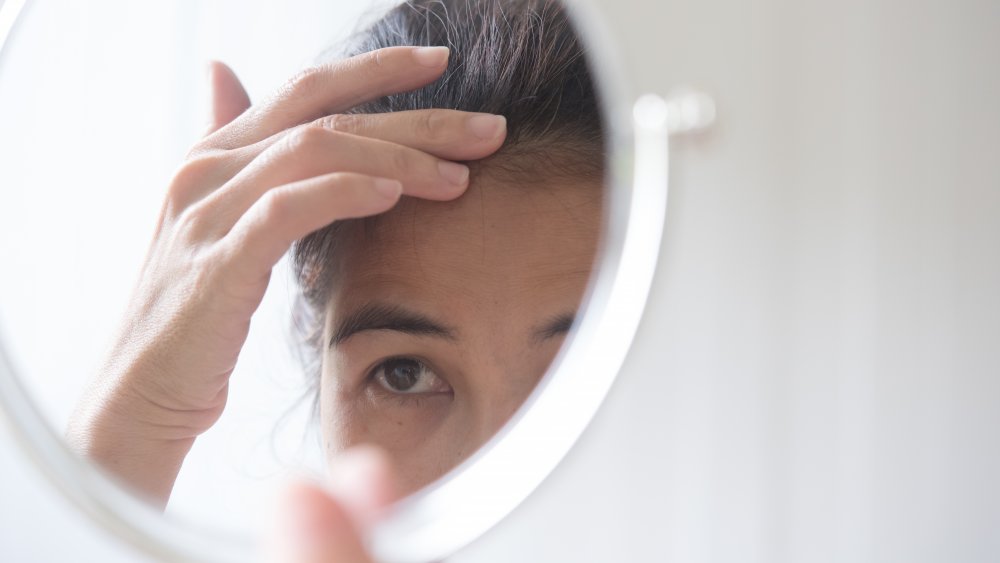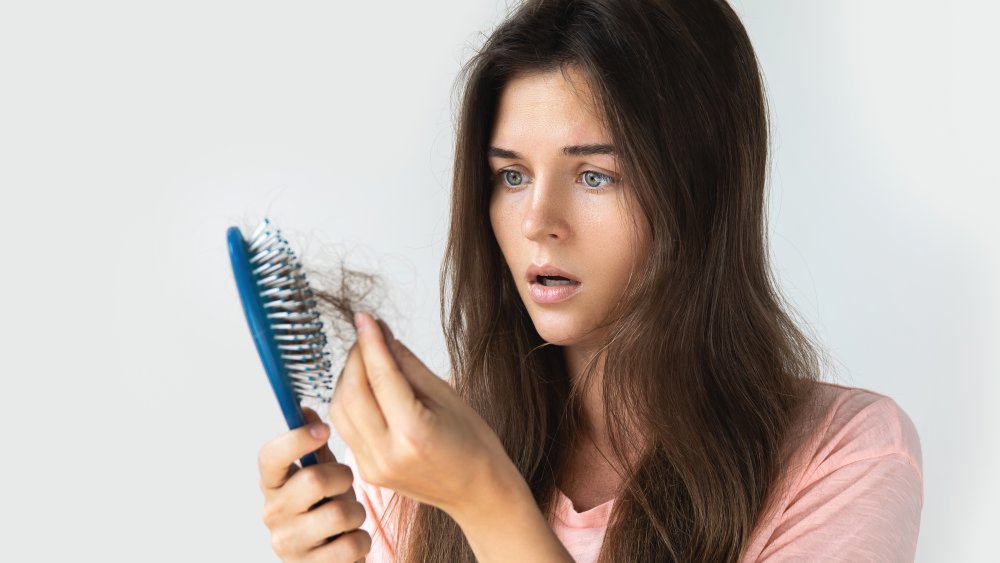Surprising Things Your Body Hair Is Trying To Tell You
Body hair is something we've all had to come to terms with since puberty. While many women pluck stray eyebrows, bleach dark facial fuzz, wax their legs and bikini line, and shave their underarms in an attempt to get rid of unwelcome fine or coarse hairs, men may shave, trim, and buzz to rein in the unruly madness of their many body hairs.
It's a fact of life that hair will happen — even if we don't want it to. But, sometimes, these hairs can pop up in unexpected places or become far darker and thicker than we've come to expect. Conversely, they may suddenly disappear or thin out. Either way, a sudden change in your normal body and facial hair can seem alarming. While there are several simple and completely normal explanations, there are a few more worrisome reasons to keep on your radar.
Want to know whether it's simply age affecting your furriness — or maybe something more concerning at play? Here are the surprising things your body hair is trying to tell you.
Losing scalp or body hair can be a sign of an autoimmune disease
If you find that you are losing your body hair, it could be an autoimmune disease at play. As explained by the Cleveland Clinic, when someone has alopecia areata, their immune system wages war on their hair follicles, resulting in a significant amount of hair loss. Hair may come out "in clumps the size and shape of a quarter."
While some people with alopecia may suddenly lose a lot of hair all over, others may lose it more slowly or in specific regions of the scalp or body. In less frequent instances, a person may lose their entire head of hair and or all of their body hair — known as alopecia areata totalis and alopecia areata universalis, respectively. Furthermore, the health institution noted that alopecia "occurs more often among people who have family members with autoimmune disorders such as diabetes, lupus or thyroid disease."
Down-there gray hair is a sign of this
When you start spotting gray hairs on your head, you might also start seeing them, ahem, elsewhere on your body. Like the gray hairs on your head, this is likewise a sign of aging. Dermatologist Rebecca Kazin explained to Women's Health that "Melanin pigments the hair, and with time, there is less melanin production, which turns hair gray." She elaborated that your hairline tends to show your age earlier and faster, though, so do not panic — your pubic hair might have a little more time before it goes fully gray.
And you may not go completely salt-and-pepper down there, either. In fact, you may discover that your body hair will become finer over time. Dr. Kazin noted that when you get older "there are also less building blocks for hair growth" as your "skin is thinner, there is less subcutaneous tissue, and follicles get smaller over time," meaning your body hair may also get thinner. So you may eventually end up with less actual leg hair, more subtle peach fuzz.
Growing hair in unusual places could be a sign of this condition
A sudden surge of male or female hormones could cause you to gain or lose body hair. According to Cedar Sinai, hirsutism occurs when a woman has high quantities of male hormones (androgens) coursing through her system. Her body responds by producing hair in all the places a man would typically grow it: the upper lip, chin, jawline, back, buttocks, and chest.
According to the U.S. Department of Health and Human Services, this condition frequently accompanies Polycystic Ovary Syndrome (PCOS), a condition characterized as an imbalance in reproductive hormones. And, no, it is not uncommon. In fact, 10 percent of women of childbearing age have PCOS, and 70 percent of them report an excess of body hair (aka hirsutism). It can also cause thinning of hair. PCOS is treatable, but it's important to note that hirsutism can also be a result of other serious conditions, so you should talk to your doctor and get an official diagnosis.
If you notice your scalp or body hair thinning, you may want to get your thyroid checked
If your thyroid produces too much of a specific hormone, it's considered overactive, according to Healthline. This is known as hyperthyroidism. If your thyroid does not produce a sufficient supply of the necessary hormones, on the other hand, you could have an under-active thyroid, or hypothyroidism. These conditions can both result in a dry head of hair and thinning of hair on both your scalp and/or body.
As suggested by WebMD, if you experience body hair loss — and regular hair loss, for that matter — in tandem with other common symptoms such as "fatigue, muscle weakness, weight loss or gain, or dry skin," you should consult with a medical professional about getting your thyroid tested.
It is also important to note that certain medications that treat thyroid conditions can further fuel the hair loss fire. It can be challenging for you and your doctor to determine if your thinning mane and body hair is a result of your thyroid condition or your treatment, so be sure to consult your doctor (via Healthline).
Always been missing a patch of body or scalp hair? You could have a genetic disorder
While some people lose their body hair as a result of a health condition, others may never grow hair in the first place. As explained by WebMD, hypotrichosis is usually a genetic disorder that appears at birth and remains present throughout a person's life.
There are many different variations of these abnormalities: Congenital aplasia and triangular alopecia are just a couple worth noting. Sometimes, hypotrichosis is a symptom of another condition, like Ofuji syndrome or Graham-Little syndrome. Unlike most of the aforementioned conditions, congenital atrichia is slightly different. "People with congenital atrichia can be born with a full head of hair like any normal baby," WebMD explained. "But in early childhood they lose all their hair, and it never regrows."
Considering hundreds of genetic hypotrichoses have been identified, they must be easy to treat, right? Unfortunately, experts "may understand the genetics and the biochemistry behind hypotrichoses, [but] treating them is very difficult," WebMD explained. "Most conditions involving hypotrichosis have no known treatment."
Patchy hair loss can be a sign of an STD
Believe it or not, if you are losing body hair, it could be the result of a sexually transmitted infection or disease. As noted by WebMD, certain STIs can lead to "patchy hair loss." This is a common occurrence when someone has had syphilis for a while. So if your spotty scalp or body hair loss is accompanied by a sore throat and an itch-less rash, you should consult your doctor.
While no one really wants to talk about it out loud, getting prescription treatment for syphilis is critical to your long term health. Your symptoms may initially clear up, but the infection will remain in your body and you will eventually be dealing with more than just some occasional hair loss; syphilis can seriously harm your vital organs.
While hair loss is not a typical symptom of other sexually transmitted infection or disease, it can be a side effect of certain drugs used to treat these conditions. For example, Zovirax, a common treatment for genital herpes can cause hair thinning, per Medical News Today.
Excess facial hair can be a sign of an adrenal problem
If you adrenal glands are overactive, they are secreting too many specific hormones into your system. When a woman has an excess of androgenic steroids — like testosterone — in her body, she might get some "exaggerated male characteristics," including "hairiness of the face and body" or even baldness, as noted by Johns Hopkins Medicine.
Cushing syndrome is another adrenal gland disorder, characterized by having too much cortisol present in the system. It can be the result of taking oral corticosteroid medication or from the hormone naturally produced by the pituitary gland. This condition is often characterized by a few symptoms, such as thinning skin, stretch marks, weight gain and fatty tissue deposits, skin blemishes, and slow healing wounds. But one of the most common side effects is the overproduction of coarse body hair and the growth of visible thick facial fuzz (via the Mayo Clinic).
If your eyebrows are thinning, you may be missing out on fatty acids
As noted by research published in Dermatology Practical and Conceptual, when people experience hair loss, their diet should be examined as a nutrient deficiency can play a significant factor. When someone is lacking fatty acids, they may find that their scalp hair and eyebrow hair thins. A lack of biotin can lead to alopecia. Not having enough protein can also cause hair loss. Zinc and selenium are additional minerals that, when low, can result in thinning head and body hair. Iron is essential as well.
And, by the way, if you do decide to take hair-growth vitamins in an attempt to get a more luscious mane, don't be surprised if hair sprouts elsewhere. Clinical nutritionist Corina Crysler explained to Well + Good that it's not a scalp-specific treatment: "Just like a skin supplement wouldn't just target your face, hair-growth supplements are going to affect all hair follicles, whether on your head, face, or legs." But don't worry, ladies, you're not going to suddenly grow a beard. She explained further, saying, "Facial hair that's not existing would only come about if the hormones in your body go out of whack and testosterone is increased."
If you're losing hair, you may have an iron deficiency
While many vitamins and minerals contribute to healthy hair growth, one of the most important nutrients needed for this process is iron. As explained by the Cleveland Clinic, when there's an insufficient supply of iron in the body, your blood becomes unable to make hemoglobin. This is the substance that is responsible for carrying oxygen for the regeneration and restoration of cells, include those that incite the growth of hair.
If you are losing hair and suspect you have anemia or an iron deficiency, you should talk to your doctor. There are several ways you can boost your iron supply, though, hopefully also stimulating the regrowth of hair — because while you might not mind having to shave less often, you may not love the look of typical male- or female-pattern baldness. As suggested by Healthline, complete your diet with "iron-rich foods like spinach, peas, lean proteins — like pork and salmon — and dried fruit." Cereal fortified with iron is another great option.
Losing hair around your scalp and growing facial hair both point to menopause
When perimenopause or menopause hits, you'll likely begin to notice some changes — including changes to your body, scalp, and facial hair. According to Prevention, estrogen levels are reduced during menopause so testosterone rises, leading to all sorts of undesirable facial strays. "Initially horrifying, yes, but all perfectly normal," Margaret E. Wierman, an endocrinologist, told the publication.
A study published in the British Journal of Dermatology sought to determine the likely patterns women can expect. The general findings indicated that 26 percent of post-menopausal women ages 45 or older experienced scalp hair loss, while just 9 percent reported frontal hair loss. Still, a whopping 39 percent of these women said that their acquired new facial hair during this period — with the chin being the most common area for the fuzz. Some women noted a loss of body hair, but this was more common with those who were older.
As noted by the research, it's important for post-menopausal women to be able to distinguish — with the help of their doctors — normal changes in hair loss and growth verses abnormal ones, as the latter may be indicative of other health issues.
Extreme stress can cause your hair to stop growing and fall out
You may find yourself losing your hair if you're under extreme stress. Typically, when you think of this type of hair loss, you probably imagine losing the hair on your head. But, as noted by Verywell Mind, "excessive physical or emotional stress — like that associated with injury, illness, or surgery" can lead to the occurrence of alopecia areata. When this happens the white blood cells wage war on the hair follicles. You might notice patchy hair loss on your scalp, but it can affect the hair on your body, too.
Stress can also incite a case of telogen effluvium. When this happens, the "hair stops growing and lies dormant, only to fall out two to three months later." This can be shocking and devastating, but, fortunately, it often grows back a few months later.
Of course, no one wants to lose any type of hair due to a bout of intense stress. The good news is that with smart coping mechanisms — like eating well, meditating, and exercising — you can help prevent the shed and keep yourself healthy, strong, and balanced (via Verywell Mind).
Sprouting new hairs? You might have a bun in the oven
Congratulations, you are having a baby! Along with morning sickness, swollen calves, and varicose veins, you also get the pleasure of growing additional body hair — it's such a precious time, though, isn't it?
When you have a baby cooking, your hormones essentially go bananas (to be wholly unscientific). As explained by Healthline, you will get a surge in estrogen, which can cause an abundance of coarse hairs to crop up in new places. Most commonly, pregnant women note that their burgeoning bellies are subject to hair growth. If you have heard the old wive's tale that claims a hairy pregnancy belly means it's a boy, don't be fooled — this can happen regardless of your unborn baby's sex. Furthermore, you might develop hair on your arms, chest, face, shoulders, and other spots. The good news? Your mane will likely look fabulously thick and lustrous.
Try not to worry, though, you can choose to remove the hair or you can wait for it to resolve on its own after your baby is born. It'll typically go away or fade within a few months postpartum.
Fast-growing body hair can point to a tumor
While there are some common and benign causes for the loss or growth of body hair, there are a few more serious reasons, too. If body hair growth comes on fast and furious over the course of a few months, it can be a red flag. Endocrinologist Margaret E. Weirman told Prevention, "In these cases, we look for a tumor of the adrenal gland or ovary — both are possibilities. It's not common, but it's something your doctor will check out." Per the Mayo Clinic, a pituitary tumor may alter hormone levels. While most pituitary tumors are non-cancerous, you and your doctor will want to form a plan of action to, at least, keep monitoring it.
Type 2 diabetes is another possibility, as the condition can "damage the cells in your hair follicles," according to WebMD. You may even "notice changes before you're diagnosed." Furthermore, type 2 diabetes can affect circulation in your feet and legs, causing you to lose body hair below the knee.
These body hair changes could be serious — or totally benign. Regardless, when you notice any significant changes in your body — including its hair — give your doctor the heads-up.
This kind of body hair is a common sign of an eating disorder
According to Medical News Today, lanugo hair is typically classified as thin, whispy hairs that appear on the body of a fetus. It usually disappears before or soon after birth. It turns out, though, that adolescents and even adults can develop a type of body hair growth that resembles lanugo. As noted by the health site, this frequently occurs when someone has the eating disorder known as anorexia nervosa.
In fact, a 2009 study published in Dermato Endocrinology found that lanugo-type hair is one of the most common signs of anorexia. It often appears as "fine, downy, pigmented hairs on the back, abdomen and forearms." Furthermore, per the research, it is linked to a reduction in enzyme activity, and could be caused by anorexia-driven hypothyroidism. An individual with anorexia will likely shed the lanugo hair once they in recovery, and a healthy, nutritious diet has been restored (via Medical News Today).
If you are struggling with an eating disorder, or know someone who is, help is available. Visit the National Eating Disorders Association (NEDA) website or contact NEDA's Live Helpline at 1-800-931-2237. You can also receive 24/7 Crisis Support via text (text NEDA to 741741).


